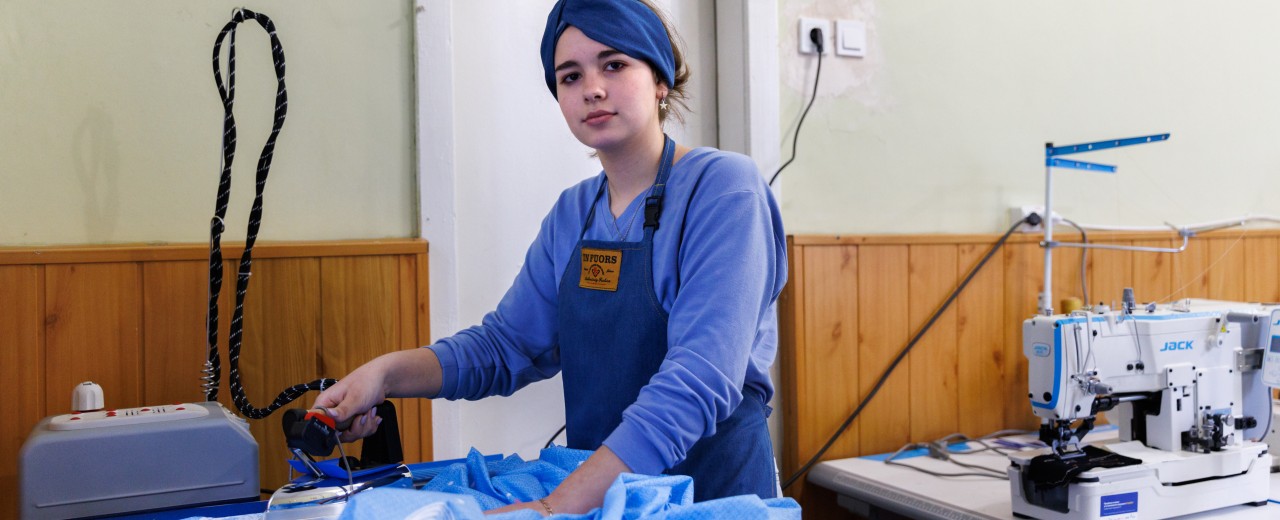Improving the living situation of the Ukrainian population through social investments – this is the goal of the Ukraine Social Investment Fund (USIF). USIF was established as an independent non-profit organisation by the Ukrainian government back in 2000. It has been a proven project-executing agency for KfW since 2008 and has successfully implemented numerous projects, with financing carried out on behalf of the German Federal Government and the EU. USIF projects are mainly focused on the rehabilitation and development of municipal infrastructure. Activities include creating housing.
The Russian war of aggression on Ukraine presents municipalities with major challenges. The existing social infrastructure, which is often outdated anyway and no longer meets modern standards, especially with regard to energy efficiency, is not sufficient to cover everyday needs. This applies in particular to accommodating and providing for internally displaced persons. For example (as of February 2024), almost four million people are refugees within Ukraine – at the start of the war, there were even more than seven million.
Housing is an urgent issue, as both internally displaced and non-refugees are often in a precarious housing situation and the supply of affordable housing is not sufficient. Municipalities are also at the limits of their capacities when it comes to providing basic social care. The war damage in the healthcare sector is significant, with over 1,200 healthcare facilities destroyed in whole or in part. Added to this are the general need for modernisation in the healthcare sector and changes in needs due to socio-demographic changes. Facilities and equipment in the education sector are also damaged or outdated. At the same time, the demand for high-quality vocational training is enormous and crucial for the future prospects of young Ukrainians.

USIF offers solutions here – financed by KfW on behalf of the German Federal Government and the EU. In order to alleviate the housing need for internally displaced persons and host communities, affordable housing is being created via USIF. This is achieved through the rehabilitation of public buildings, which are converted into housing for internally displaced persons, and in the future possibly also through new buildings. In order to facilitate a fresh start, social facilities such as kindergartens are being renovated as well, which also benefit the local population.
USIF also promotes patient-friendly rehabilitation and the expansion of municipal health centres and hospitals at selected project sites in Ukraine. This concerns both primary health care and the consideration of specific health needs in hospitals (e.g. cancer prevention, women’s health, etc.), which are being modernised, also to be more energy-efficient. Medical equipment is provided as well. This includes equipping a neurosurgical operating room at “Ohmatdyt” National Children’s Hospital in Kyiv or equipping the “Unbroken” rehabilitation centre in Lviv with devices for regaining limb movement.
In the field of vocational training, USIF implements the rehabilitation and equipping of vocational schools, which offer training courses in the fields of agriculture, industry and mechanical engineering, construction, transport and communication, as well as the textile industry and food services. In addition, selected vocational schools are being expanded into competence centres.
Energy efficiency is an important concern for all USIF projects. Both healthcare and educational facilities and homes are being renovated in an energy-efficient manner. The supported measures include the renovation of heating and ventilation systems, the insulation of facades and roofs, the installation of thermal windows and meters, and new lighting. This is important not only with regard to climate action, but also in view of the fact that there are repeated bottlenecks in the energy supply due to the destruction of energy infrastructure by Russian attacks.
On the one hand, USIF’s local structures and staff, who have specific expertise in social infrastructure, provide great additional value in the efficient implementation of social investments, as do good networking with communities, civil society and the local private sector. This way, it is, for example possible to jointly decide which buildings are best suited for rehabilitation.

The measures financed by USIF make a significant contribution to improving the living situation of the local population and to the social integration of internally displaced persons. Providing basic infrastructure that is available to all counteracts social inequalities. It also prevents competition for social services that are in short supply.
Since the start of the Russian war on aggression on Ukraine in 2022, USIF has successfully carried out a number of reconstruction measures in Kharkiv, Zaporizhzhia, Dnipro, Odessa and Ternopil. They include
In addition, equipment totalling more than EUR 7 million was procured, including emergency aid for internally displaced persons, agricultural and construction machinery, medical and educational equipment. There are currently seven other facilities for the accommodation of internally displaced persons, more than 15 vocational schools, 16 medical facilities and four accommodation facilities in progress.
The energy savings through renovation measures not only help to reduce CO2 emissions, they also relieve the burden on municipal budgets.
The USIF-projects support the Ukrainian government’s efforts to nationally implement the 2030 Agenda. The investments contribute to the achievement of SDG 1 “End poverty in all its forms everywhere”, SDG 3 “Ensure healthy lives and promote well-being for all at all ages”, SDG 4 “Ensure inclusive and equitable quality education and promote lifelong learning opportunities for all”, SDG 7 “Ensure access to affordable, reliable, sustainable and modern energy for all” and SDG 11 “Make cities and human settlements inclusive, safe, resilient and sustainable”.
Share page
To share the content of this page with your network, click on one of the icons below.
Note on data protection: When you share content, your personal data is transferred to the selected network.
Data protection
Alternatively, you can also copy the short link: https://www.kfw-entwicklungsbank.de/s/enzB0CbD
Copy link Link copied